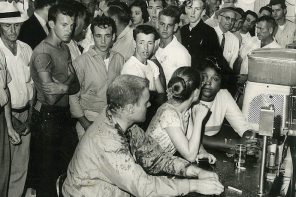Although the issues are hugely important and the positions of the candidates highly individuated, the 2008 election has thus far been one less about policies than about prejudices and personalities. The economic crisis may reverse this emphasis. But the fluidity of the polls—up today, down tomorrow, or vice versa, depending on your candidate—suggests instability in political preferences, with relatively minor occurrences having major consequences. If current economic worries subside or new foreign or military fears emerge, voters’ preferences may well reverse again. Some of the reasons for changed preferences are typical of presidential campaigns; however, the degree of instability, especially among Independents and in some areas, is unusual. But, of course, the candidate of the Democratic Party is unusual.
Four out of five Americans agree that the country is heading in the wrong direction (they do not agree on the right direction). A sizable majority prefers Democrats on policies, as a party, and down the ticket. Nevertheless, Barack Hussein Obama has, at least until recently, been running close—a few points up, a few points down—to John McCain. I am not going to argue merits here; I am going to begin with one fact and build on it. The fact: Obama is black. The conclusion: he will win or lose if he overcomes or fails to overcome, respectively, some atypical factors in play, including and starting with his race.
A sizable minority of Americans, most, but not all, of them white, is operationally prejudiced against blacks (different by degree from the casual racism latent in many Americans of all races). Those in the South were once Democrats but, since the Civil Rights Movement, are now Republicans. Those in the North are those who otherwise vote Democratic: white, blue-collar families in West Virginia; white, blue-collar families who migrated from the South to industrialized northern cities in the 20s and 30s; and urban, ethnic, Catholics whose origins are mainly eastern or southern European. Paradoxically, West Virginia seceded from Virginia because its residents had no interest in defending a slave-based economy which did not exist in its six counties, but its racism transcended its economics.
The minority’s racism transcends religion. Southern Baptists constituted the membership of the White Citizen Councils and the Ku Klux Klan. Those who moved north left when racism was virulent and lynching commonplace, and brought their racism with them. Catholic immigrants to the northern industrialized cities of the Rust Belt and the upper Midwest—Buffalo, Erie, Pittsburgh, Youngstown, Warren, Akron, Cleveland, Toledo, Detroit, Flint, Milwaukee—attended churches which have long ignored or tolerated the prejudices of their congregants, and did little enough during the Civil Rights Movement. Racism still prevails in these white populations born or bred to racism, unredeemed by religion, and demoralized by a lifetime of economic decline.
Of course, racism defies religion. For Christians (and Jews) who oppose Obama because of these their prejudices against blacks disobey fundamental religious injunctions to love one’s enemy (or respect the stranger). I would argue, admittedly presumptuously, that indulging prejudice defies God, Who would be unlikely to love (or forgive) those deliberately rejecting His injunctions. I would mention and invoke the meaning of the unfashionable and “uncomfortable” notions of The Second Coming (or Day of Judgment). I would also argue that people acting on prejudices reject one of the central tenets of American democracy as articulated in The Declaration of Independence: “all men are created equal.” How such people, if challenged, would justify their apostasy to their professed religious and political allegiances I cannot imagine.
Although racism may be the most important factor in any explanation of persistently close contests in Pennsylvania, Ohio, Michigan, and Wisconsin, it is not the only one. Age itself is another, on both sides of the ballot. First, Obama is relatively young, but a few years older than Kennedy was when he ran in 1960. Second, a disproportionate number of racist voters are older ones, for whom change is not something likely to appeal, especially since they are settled, however marginally and morosely, in once stable but now deteriorating neighborhoods into which blacks or other minorities are moving and from which so many of their children are departing, physically and often politically. Thus, growing southern and western states—Virginia, North Carolina, Florida, Colorado, New Mexico, and Nevada—verge on tipping from red to blue in this election.
The Republicans’ Southern Strategy reflects, not racism indigenous in the South, but racism imported to the North. It arose as a response to defeat. In 1948, after the first election after Roosevelt’s death, Republicans learned that they could not win presidential elections with former Dixie states and a belt of plains and mountain states only. In 1968, in the full tide of the Civil Rights Movement, George Wallace demonstrated the appeal of racism to these northern blue-collar workers, and Ronald Reagan attracted them, the “Reagan Democrats,” a dozen years later. So Republicans learned that the demographic facts-of-life in these northern industrialized areas could serve as the basis of an appeal to race if the race card was carefully played. Such has been the Republican strategy in every presidential election and many congressional elections for 40 years.
This reliance on racism explains why, despite patently hypocritical claims to want to become inclusive, the Republican Party remains largely white and more male than female. At its 2008 convention, for instance, only two percent of the delegates were members of minority groups, and male delegates outnumbered women delegates about two to one. To judge by these numbers, the Republicans still play to an America conceived as predominantly white.
Racial prejudice against Obama appears in several ways. One is the denial by racists of their prejudice but their attribution of racism to others—a ploy known as projection. (Pollsters are having a difficult time estimating the extent of racism as a factor in this campaign because people do not admit to racism—one reason I am leery of poll results.) A second is not-too-subtle racist language: Obama is a “boy” or his name is “Balack”—such are clear enough examples. A third is McCain’s refusal to address or make eye contact with or otherwise acknowledge the presence of a black rival in a televised debate, or to be courteous to him when approached on the Senate floor. There are others.
The majority of racists who deny or keep silent about their racism adopt subterfuges of religious or ethnic prejudice against Muslims or Arabs. Obviously, his very name Barack Hussein Obama suggests an Islamic or Arabic background, which, in a post-9/11 world and its war against terrorism, gives these prejudices cover and seasoning. Some refer to or express doubts about Obama’s religion—that is, he was or remains Muslim—or his nationality, with name-playing linking Barack Hussein Obama to the former Iraqi and the current Al Qaeda leader. They reject readily available facts that he was raised and has remained a Christian and was born in America; and they accept that religious and ethnic prejudice is, in these historical circumstances, all right.
The nexus of black race, antagonistic religion, and foreign nationality is certainly new to American presidential campaigns. But I wonder if it perhaps unwittingly harkens back to an old cultural motif. In many popular medieval and renaissance romances, some of which were adapted as children’s literature in the seventeenth, eighteenth, and nineteenth centuries, a white, Christian, hero often opposes a black, Saracen (i.e., Muslim) invader, a hostile champion commonly referred to as a devil. This motif combines features of the “Other” which match prominent features of Obama’s appearance and imputed identity. If this motif still survives in our culture (consider Darth Vader), not only may McCain’s life-long disposition to demonize his opponents find its perfect foil in his rival for the presidency, but also his attack strategy may, consciously or not, exploit this cultural reservoir of antagonism and apply it to this particular Other. If so, the motif goes some way beyond McCain’s combative personality and his moniker “McNasty” to explain his ends-justifies-the-means attacks, many of which use darkened images conventional to political advertisements to even greater effect in depicting a black man.
I do not deny that the choice in this election is between candidates who differ greatly in both personality and policies. Likely McCain voters accept his temper, impulsiveness, and campaign conversions on long-held views; like his bellicosity in foreign affairs and unwavering opposition to abortion and women’s rights; and approve his instincts to enlarge presidential powers, promote corporate interests, and limit or eliminate individual freedoms. They want centralized power and continuity of policies, especially of war and tax policies, of a polity of, by, and largely for whites. Likely Obama voters want a return to a traditional democratic system of governmental checks-and-balances so that America can adapt it to meet the 21st-century needs of a pluralistic society: reformed economic, educational, and health systems; synergistic energy and environmental policies; rebuilt infrastructure; and cooperative international policies. They want inclusivity, participation, and reform, with new, flexible, and robust approaches to new technologies and new economies.
I hedge my bets about the outcome of the election. But I am sure that, to some considerable degree, it will reflect victory over or defeat by this syndrome of associated factors. Individually, they are strong; collectively, they are far stronger. Whether their strength will overcome informed self-interest among those prone to act on fears of the Other, variously defined, remains to be seen. My fear is that those for whom prejudice is a fact, perhaps an unknown fact, of their lives will, when the time comes to vote, vote by default for the heroic candidate, John McCain. In a close election, their secret ballots will reveal America’s darkest secret: racism lives in our belief in The Great White Hope.



